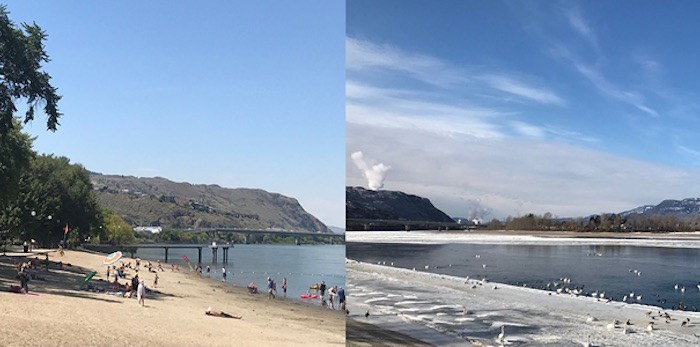On day two of class, Dr. Tom Pypker talks to students in his first-year Thompson Rivers University (TRU) climate class about the difference between climate and weather.
"Weather is just a chaotic event that occurs," he says. "It can swing back and forth; we can't predict it very well."
"Climate is controlled by other things."
 Kamloops has seen its share of extreme weather events. Pictured above: Riverside Park in the summer and winter. (Brendan Kergin)
Kamloops has seen its share of extreme weather events. Pictured above: Riverside Park in the summer and winter. (Brendan Kergin)
Those other things are much broader patterns than the day-to-day wind patterns; Pypker points out things like greenhouse gasses and reflections of the sun's rays play into it. And while weather is short-term, looking at how things are working on a daily or weekly scale, climate is long-term.
One way to look at it is like a meal you eat and your overall diet. Pypker uses Christmas as an example.
"If you think about Christmas, you may eat a lot at Christmas dinner," he says. "But that wouldn't be a good predictor of how you eat regularly."
Something that he says frustrates him online is people's immediate reactions to a day with extreme temperatures, either hot or cold. Often people on social media will say climate change is fake on cold days, while on hot days they say it's real, but it's the long-term averages that Pypker notes determine climate.
"I would love for more and more people to grasp this concept of weather and climate," he says.
Essentially, just because a city like Kamloops sets a heat record doesn't immediately prove climate change; just like eating a healthy lunch doesn't make you a healthy person.
"A hot day or a cold day doesn't prove or disprove climate change," he says. "We are likely to see more extremes."
However, despite short-term variations, a pattern has been observed around the world and close to home.
"If you look at the long-term weather trend at the Kamloops Airport...there is a statistically notable slope," he says.
That's taking into account long-term temperatures averaged over more than just a day and often a year.
And while generally warmer days are more likely to happen over a year, extremely cold days can still occur. Pypker says there's research that shows evidence that extreme colds may occur more often in the winter due to a break down in the system that keeps arctic air over the Arctic.
Pypker also notes that while the weather might be normal in one part of the world, other parts may be experiencing extremes.
Globally, he adds, last year was the fourth warmest on record, and that's the climate change that scientists are researching. And predictions based on past climate change models are matching with current patterns.
"In the future, we can expect more hotter days and fewer colder days; that trend is playing out," he says. "All the indicators point towards warming."
That's something echoed by an associate of his. Dr. Will Garrett-Petts, associate vice-president of research and graduate studies at TRU, noted global climate trends when recently interviewed by KamloopsMatters.
"As it happens, on the day that you're asking me that question, for the first time in history, it's snowing in Hawaii," he said. "Yes, there is concrete evidence that we're experiencing climate change."
And climate change is affecting a lot more than just the average temperature days, Pypker says.
"It'll have real ramifications," he says. "All ecosystems have to adjust, but the time frame isn't very long."
Drier, hotter summers are one of the more obvious effects people living in B.C.'s Interior can expect, and while that doesn't necessarily mean record-setting wildfires every year, it does mean conditions are more likely to allow for them. But warmer, drier summers mixed with the impact of the fires have further impacts, he says, with "messed-up hydrology" and "messed-up water regimes."
And those fires, with a longer season, affect jobs. Take the lumber industry for example.
"We already have a short-term timber supply problem," he says.
One particular impact of climate change locally will be on the salmon runs that cut through B.C.'s Interior. On top of warmer averages, streams where salmon spawn are being affected by a lack of water due to less precipitation. That means warmer water, which is, to put it simply, bad for the salmon. That could be compounded by melting glaciers, Pypker says; as the glaciers disappear (which has been predicted by climate change scientists and there's evidence it's happening), there'll be less water for the streams, which means shallower water and warmer water temperatures.
Then that issue impacts the region's agricultural industry, because farmers also rely on water from local streams, according to Pypker. He says there needs to be a balance in how that limited resource is used.
If it affects salmon, it'll affect the whole food chain, given that so many animals rely on the fall salmon run for food.
Carbon dioxide levels are another contributing factor to climate change, Pypker explains. As CO2 levels increase, so does the acidity in the ocean, he says. That impacts shellfish (their shells are made of calcium-carbonate) and the rest of the food chain.



